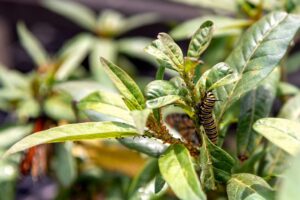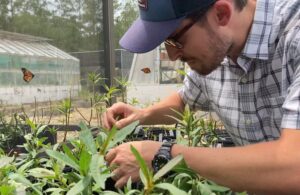Aug 18, 2023Aphids discourage pollinators from tropical milkweed
Though aphids are the bane of many home gardeners’ existence, a new study University of Florida (UF) study shows the tiny pests also pose problems for the iconic monarch butterfly.
Insect pollinators are essential for crop pollination and ecological diversity. In recent years their numbers are low partly due to loss of native wildflower habitat, especially in the agricultural landscape, according to the Sand County Foundation, an environmental and conservation group.

The study found that when oleander aphids infested tropical milkweed — a nonnative milkweed species commonly used across southern portions of the U.S. stretching from California to Florida — the butterflies laid fewer eggs on the plants, and caterpillars developing on those plants were slower to mature.
Monarch butterflies depend on milkweed and its close relatives to complete their life cycle. The study’s findings suggest that when aphids attack tropical milkweed, they compromise this monarch resource, according to a news release from UF’s Institute of Food and Agricultural Sciences (IFAS).
“Around the country, efforts are underway to plant milkweed in urban areas to support monarch populations. We know that aphids and similar insect pests commonly reach high densities on plants, including milkweed, in urban settings. Our study helps us better understand how such pest outbreaks may affect monarch survival on the most common ornamental milkweed species produced and planted in the South,” Adam Dale, senior author of the study and an associate professor in the UF/IFAS entomology and nematology department, said in the release.
Throughout the southern U.S., tropical milkweed is commonly used both to attract and support monarchs and as an ornamental plant, and many nurseries and big box stories carry it. However, milkweed often harbors oleander aphids, a type of aphid that goes after oleander and milkweed plants. Oleander aphids suck the sap out of the plants, stunting them and leaving behind a moldy residue.
“It’s long been known that oleander aphids flock to milkweed, especially in nurseries and urban areas, and that led us to wonder if and how that affected the monarchs who used these plants,” Bernie Mach, first author of the study and a postdoctoral researcher in the UF/IFAS entomology and nematology department, said in the release.

While the study did not investigate exactly why aphid-infested plants are poorer hosts for monarchs, the scientists say that past research on how aphids affect tropical milkweed, combined with their findings, offers some clues.
“Milkweed defends itself against pests with chemical compounds in its sap called cardenolides — this chemical is actually what makes monarch butterflies toxic to certain predators,” Mach said in the release. “Tropical milkweed has particularly high levels of cardenolides that ramp up even more when it is attacked by large infestations of oleander aphids. We think that these ramped up levels may deter monarchs from laying eggs on these plants and also affect their caterpillars.”
However, one point is clear: Aphid-free tropical milkweed appears to give monarchs a better chance at success.
In the study, the researchers grew tropical milkweed in a nursery setting, introducing aphids to one group of plants while keeping another group aphid-free. The researchers released monarch butterflies around each group of plants, then counted the eggs the butterflies laid on the plants. The butterflies laid three times as many eggs on aphid-free plants as they did on aphid-infested plants.
The researchers also monitored the development of the caterpillars that hatched out of those eggs. At the end of the experiment, caterpillars on aphid-free plants ate twice as much leaf material as caterpillars on aphid-infested plants. All caterpillars on aphid-free plants grew to full size, while most of those on the aphid-infested plants lagged behind or died.
Read more about the study here.









